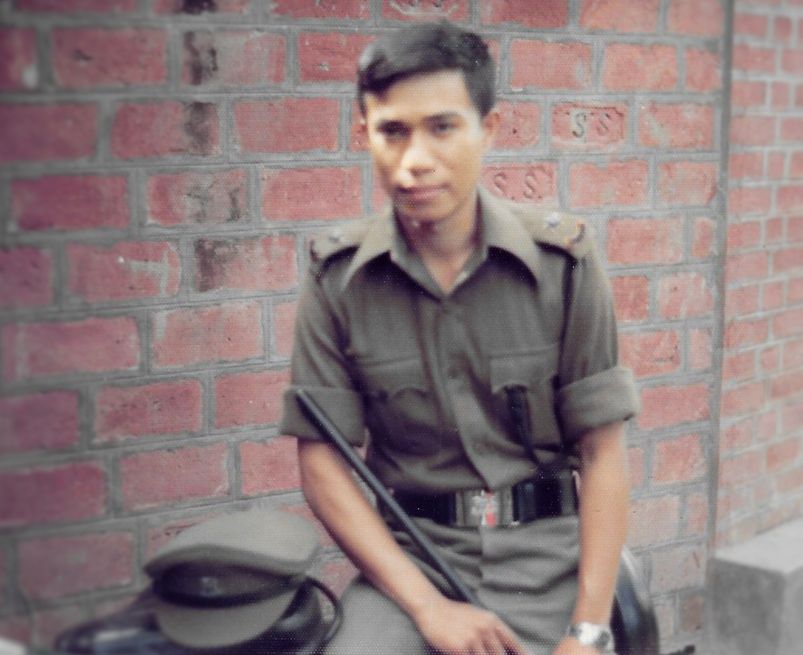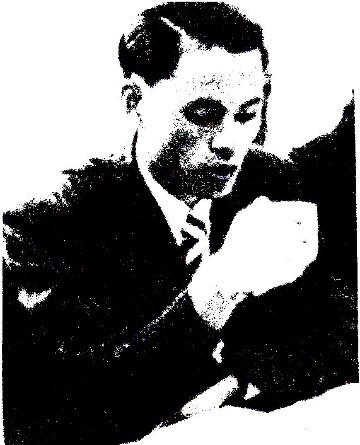
The late Moirangthem Shantikumar Singh as a young officer Major in the Manipur Rifles
Afterword
- Epilogue of the book : Dr Mohendra's Memoir to be published -
Dr Mohendra Irengbam *

The late Moirangthem Shantikumar Singh as a young officer Major in the Manipur Rifles
We are now into a whole new phase of the pandemic. I am itching to head off on holiday to Imphal as soon as the logistics are in place. From the data issued by WHO, and the increasing number of vaccinations worldwide, I am toying with my considered opinion that the Covid virus will subside fairly soon, to the level of the ubiquitous Influenza virus.
While waiting for normality to return, I want to skip ahead of time, to wrap up things and conclude my memoir. I have taken those epiphanies I have gleaned from my experience and used them to light the way forward. I want to end my memoir as the natural culmination of my life story with this epilogue.
Before I begin to navigate towards a happy ending, I want to stress that my life has not been without historical trivia. We are all humble sinners and a man or a woman's private peccadillos should be given a sliver of mercy.
The book was conceived in September 2020 and it was born as weekly articles published in local newspapers in Imphal. The topics in this book are not really new. I wrote some of them years ago and they were published in The Sangai Express. But they were not descriptive and were without photographs to lend verisimilitudes to my story. [These photographs are solely for educational purposes].
This is a story book of history made personal. It is written without indulging in scholarly curiosity, and is far from being exhaustive. It is a project to break the monotony of my life during the Covid pandemic lockdown. It is a recording of some of the life and beliefs of a vanishing age.
The story-line goes back 80 years and it is unlikely for the young generations to be acquainted with them. There are many interesting anecdotes about life and events in Imphal/Manipur, physically expressed in mendacious living and a vast array of pageantry. It is the story of Manipuris, who in a world so large, were quite content with the then peaceful niche of it.
The Imphal town with its green modesty of bamboo-backed ingkhols in the certitude of its style, its poor economic magnitude but with strengths of wiry character of its people and the serenity of thatch-roofed and bamboo-pillared Yumjaos, was a feast for human eyes.
During my long student years, every time I came home after a year's study in the cities outside, Imphal looked like a place that had been wasted and recovering after a tsunami. But, in a couple of weeks, my eyes would see its pristine nature, untouched by technological and industrial culture, which was quite covenant with my birth and the secrets of my growing up. I would soon forget the city and the civilised life with flush toilets. I would be bathed in a constant flow of emotions lifting over the mundane realism.
It is not clear what life will be like after the pandemic lockdown is over. Psychologists predict it will never be the same with social consequences. Already, 5 year olds are having mental aberration. They are frightened to go out and meet friends as an after-effect of their statutory isolations.
My brain during the beginning of the pandemic, was a hive of restless activity with the realisation that death at my age, was a simple matter of meeting someone with the virus, not preordained by god or destiny. Writing my memoir with deja vu, has helped me to eliminate frequent peaks of my anxiety about life in general.
Imphal, my home town, burns like a flame of purest memory. It might have been quite a bit behind the times, but I do not believe there is another place on earth comparable to its simplicity and quietude, with its history of having been lived in by people with a fierce and unshakable advocacy of their past.
It is an experience that has to be earned. It is this remembered information that gives the vivid story form of the book. I have a need to bear witness to what I saw. I want to tell you what it was like, trimming the short edges of memories.
Though I will always be a visitor to Imphal now, I will forever remain one with the passionate belief that Imphal was the most beautiful town. Home, Sweet Home. "You know I'm a dreamer, but my heart is of gold. I had to run away high, so I wouldn't come home low, just when things went right. And you'll never feel left alone." (Mötley Crüe).
This memoir will never be complete without a penetrating tribute to Moirangthem Shantikumar Singh of Uripok, who beleaguered me in writing it. He published the first few articles in a series in the Sangai Express and desired to publish the whole lot in a book form later. But fortune has cheated him from the path he has already set out for us.
Shanti has been dealt one of fate's cruellest cards. He passed away on December 8 2020. He did not see the completion of my insubstantial memoir. He was only 70 years old. Without his gentle persuasion and speaking with gentle cadence in my ears by telephone, this memoir would have been poorer. Because of him, the burden of my private thoughts came out in the form of a gusty narrative.
Shanti was a person with an inner calmness, self-composure and serenity that rested and relaxed him. He had no penchant for outrageous behaviour. With an infectious smile and a sense of levity, gravity and propriety, he was an easy person to get on with everybody.
As a high ranking police officer, he never sailed close to the wind. He was so honest and politically correct that many people wondered aloud if he was in the right profession. Even during the messy height of insurrection where the valley was struck in a cycle of violence, he made history. He enjoyed the respect from the revolutionaries, while biased by his colleagues in the force, as all his dealings were equitable. I was told that 'he did not actually need his armed police escorts that were provided. The insurgents would not do him any harm.
What Shanti did not know was that, he had credible values, which operated as guides on the route to doing the right thing, and which in his profession as a policeman, might not be appreciated by fellow officers. He had esteemed values of fairness, respect, care and honesty. He was a good husband and dedicated to his children.
About Shanti's congeniality in his relationship with his siblings and people in his Leikai, one has to read his junior brothers' eulogy in his obituary in the Sangai Express. And that he was a family man, was captured in the words of his daughter Leisana, who opened her heart to me:
"Papa being in the Police Service didn't have much time most days. So my younger brother and I would skip school to accompany him to his training and hill postings. He tried his best to protect us from the unrest. And in his free time, he would teach us maps, history, science, ethics and values. Papa loved reading. He loved books. He loved learning. Even during his last days, he was reading and learning about the Pandemic and was following the US president."
I know Shanti's life story from his birth. That makes a slow, spiralling, sometimes disorienting read, which in the right mood, is not a bad thing. I loved Shanti like my son. I will miss him for eternity.
Time is becoming of the very essence. I will end this memoir with the thought that even the pragmatic men have their dreams, and an old man like me, has his vanities. I have always carried on my shoulder a sizeable and quite unnecessary chip.

Dr I M Singh : July 22 2021 : The United Kingdom
Author's website: drimsingh.com